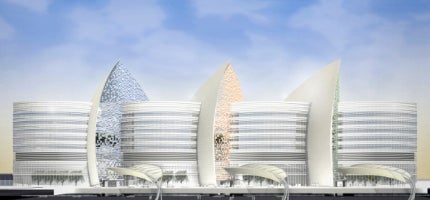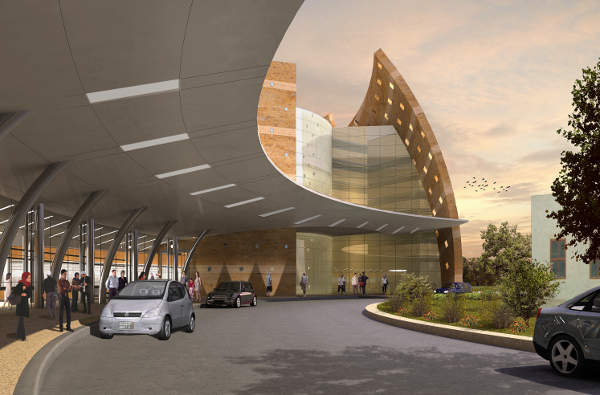
Located in Doha, Qatar, Sidra Medical and Research Center will be an ultramodern, all-digital academic medical centre, designed and planned to the highest international standards in technology, science and patient care. Sidra is currently under development and will be located on the Education City campus, which is owned by the Qatar Foundation.
Announced in June 2004, Sidra represents the vision of Her Highness Sheikha Moza bint Nasser, Chairperson of Sidra and the Qatar Foundation, to create a hospital and research centre catering to the needs of women and children in Qatar. The high-tech Sidra facility will not only provide world-class patient care, but will also include medical education and biomedical research facilities. Sidra is funded by a $7.9bn endowment from Qatar Foundation, one of the largest endowments for a medical and research centre in the world.
As a premier medical school in Education City, Weill Cornell Medical College in Qatar will be involved in all three of Sidra’s missions – patient care, medical education and biomedical research. Sidra will serve as a primary teaching venue for Weill Cornell medical students. It will provide the students with the opportunity to develop and practice their clinical skills with the guidance of experienced Weill Cornell faculty and to conduct scientific research using the ultra-modern technology available at Sidra’s state-of-the-art facility.
Sidra will also work in conjunction with Hamad Medical Corporation (HMC), Qatar’s public health provider, to ensure that the patient services offered by the two entities are complementary and that, together, they provide the full range of learning opportunities for medical students. HMC will also be involved in biomedical research with Sidra and will house some of the early research efforts until Sidra opens.
Medical centre facilities
Sidra will initially have 400 beds and a floor space of over 139,000m² (1.5 million ft²). The academic medical centre has three atriums which will focus on children and women’s health. An additional Outpatient Clinic building connected to the centre at every level will have 37,160m2 (400,000ft2) of space dedicated for ambulatory care.
As of February 2013, the Sidra project team responsible for setting up hospital operations and planning currently has over 240 staff members and will employ over 4,500 clinicians, nurses, allied health professionals and support staff after the hospital opens and becomes fully operational. The centre has parking spaces for approximately 1,000 cars for staff and1,000 for the public. The hospital will be expanded to 550 beds in a subsequent phase. The future phase of expansion at the centre will also add another ambulatory clinic building.
Advanced medical, research and management technology
Sidra Medical and Research Center will be equipped with advanced technology, sophisticated medical equipment and state-of-the-art laboratories for innovative research and clinical advancement. The centre will be an all-digital facility with wireless technology, using sophisticated IT applications for clinical, research and business functions.
The centre will feature the most advanced technologies available, such as robotics, computer-aided surgery, digital imaging and diagnostics. All work at the hospital and biomedical research centres will be carried out by using paperless and wireless technologies.
Sidra’s informatics system, Patient Electronically Accessible Record for Life (PEARL), will ensure instant and seamless access to accurate information at the touch of a button.
The centre will have Healthcare Information and Management Systems Society (HIMSS) Analytics Stage 7 designation within months of opening. Sidra’s advanced Information Technology solutions will make a significant contribution to the realisation of the national e-health strategy of Qatar.
Construction of Sidra Medical and Research Center
The new medical and research centre broke ground for construction in mid 2008. The aim is to equip the Sidra building by the fourth quarter of 2013. Sidra is working closely with its partners to finalise exactly when the Medical and Research Center will be fully operational.
The new medical and research building has three atriums, which will serve as indoor healing gardens, dividing it into three main sections for different services. The atriums are constructed using ceramic tiles, metal panels coated with enamel and glass with stainless steel accents and sunshades. The lobby and other public spaces in the centre are being built with natural materials such as wood, granite and marble.
Architectural and construction contractors
Related project
DuBiotech, United Arab Emirates
DuBiotech, or the Dubai Biotechnology and Research Park, is a science park development in the city of Dubai.
The architectural design for Sidra Medical and Research Center was provided by Pelli Clarke Pelli, an architecture firm based in the US. The initial clinical planning for the Center was completed in late 2005 and the architectural design was announced in early 2007. A key project milestone, Sidra’s schematic design, was completed in the summer of 2008.
The construction contract worth $2.3bn was awarded to a consortium of Obrascon Huarte Lain and Contrack. The space programming contract was awarded to Kurt Salmon Associates. KEO International acts as the construction manager, while Qatar Petroleum / ASTAD are serving as client representative on behalf of Qatar Foundation.
In January 2013 Omnicell, along with its partner Mannai Corporation, was awarded a contract to provide its G4 medical supply platform to the centre. The scope of the contract includes providing wireless and virtually paperless nursing and pharmacy operations.
In January 2013, Amcom Software was awarded a contract to provide communication software for the centre. The scope of the contract includes providing emergency notification and call centre solutions to Sidra.






